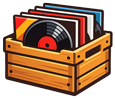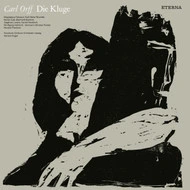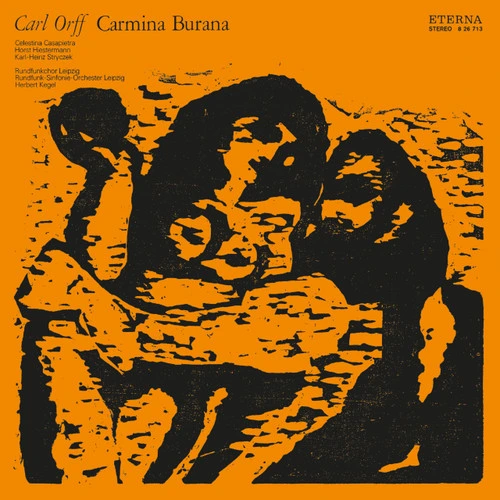Release Date To Be Announced pre-order your copy today!
Master Quality Reel To Reel Tape!
This item not eligible for any further discount offers!
Each Reel-To-Reel Tape is made to order and is typically here within 2-4 weeks!
Born in Munich in 1895, Carl Orff is one of the most fascinating musical theatre figures of the period. His characteristic and distinctive style was sparked by an attraction to sonic experimentation. A fact which makes listening to this uncompressed recording a special delight.
The traditional orchestra arrangement with soloists and a large, slightly unusual percussion section, make up the typical "Orff" sound.
Herbert Kegel is considered one of the leading, if not the undisputed best conductor of contemporary music. Carl Orff himself was an ardent admirer of Kegel's recordings.
WHAT EXACTLY IS AN 'ORIGINAL MASTER TAPE'?
Good question. The term is sometimes misused or misinterpreted, so it's worth getting clear on what's what. When an album is recorded, whether in the studio or on stage, it will either be a multi-track recording using several microphones and/or different sessions to record each individual element separately (instruments, vocals), or a live or semi-live recording in which one or several microphones capture the performance as a whole. The recording engineers will then bring the various elements together, editing and mixing them to achieve the desired sound and to remove unwanted noise, culminating in the album's first final arrangement. This is the original studio master tape, of which there will be not just one, but several: each of these is considered an 'original master'.
This original master is then used as the 'blueprint' for all subsequent copies, pressings, remasterings, etc. But of course with each subsequent treatment, something of the original information and hence sound quality is lost. Which is why nothing sounds quite like the original studio master tape. It's the original source of the album in its completed state.
DOES HORCH HOUSE DO ANY KIND OF REMASTERING DURING THE COPYING PROCESS?
Absolutely not! Why mess with the best? The whole point of what they do lies in capturing the magic of the original analogue master tape in its purest, most faithful form possible.
'Remastering' can be compared to using computer software to edit an original photograph. The benefits are that you can remove unwanted marks or noise, clean things up, remove distortion and boost clarity. The downside is that in doing so, you often lose the natural essence of the original and the result can seem rather synthetic, lacking in real life character.
The unfortunate fact is that tapes, like photographs, do tend to age over time, and most analogue masters are now between 30-80+ years old.
So Horch House undertake a painstaking 'soft refurbishing' process, which is key to recapturing the original quality of a master tape.
CAPTURING THE MAGIC OF MASTER TAPE
How exactly does Horch House translate an original analogue master tape into faithful copies on reel-to-reel tape and vinyl records?
They use a process that's been meticulously researched and developed by their expert team of sound engineers, with input from some of the world's leading specialists.
The first step is to carefully assess the sound quality of the original master tape, which their experts do in great detail. The unfortunate fact is that tapes do tend to age over time, and most analogue masters are now between 30-80+ years old. What they're looking to do, therefore, as an integral part of their copying process, is to restore the sound quality back to its original level. They want you to hear exactly what the first sound engineers heard (and indeed the musicians themselves), on the day that the original recording was made. This is in stark contrast to any kind of 'remastering', which they most definitely do not do! They're not looking to 'improve' the recording in any way, but rather to return it as closely as possible to its full original beauty.
They call this their 'soft refurbishing' process.
HOW CLOSE ARE HORCH HOUSE COPIES TO THE ORIGINAL MASTER TAPES?
Horch House believe that they're as close as it's possible to get - not simply to the master tape in its current condition, but to that master tape's original condition. Thanks to their detailed 'soft refurbishing' process, their master tape copies could, in a sense, now be considered as better than the current originals because they've been lovingly restored to deliver the same sound quality that the originals had on the day they were first recorded.
WHAT ABOUT COPYRIGHT? ARE MASTER TAPE COPIES LEGAL?
All Horch House master tape copies are fully authorized, licensed and approved by the relevant record label/music publisher.
** It is standard practice in all recording studios to keep the tape "tail out". This reduces "pre-echo" and it means that the tape should be placed on the right hand side of the recorder, re-wound and then played.
Features
- Studio Master Copy
- 4-Reel Tape
- Tape Material: RTM SM900
- Recording Speed: 15IPS - 38cm/sec
- Rec. Level (mag flux): 510 nWb/m
- Equalisation: CCIR
- Width & Tracks: 1/4" - 2 Track
- Reels: Metal - 10.5" - 26,5 cm
- Production on Studer Machines Refurbished to Factory Specification
- Handmade
- Fully Authorized, Licensed & Approved by the Record Label/Music Publisher
- Horch House Deluxe Packaging
Musicians
| Karl-Heinz Stryczek | baritone |
|---|---|
| Wolfgang Hellmich | baritone |
| Reiner Suss | bass |
| Horand Friedrich | bass |
| Siegfried Lorenz | bass-baritone |
| Hermann Christian Polster | bass-baritone |
| Eberhard Buchner | tenor |
| Harald Neukirch | tenor |
| Magdalena Falewicz | soprano |
| Radio Sinfonie Orchester Leipzig | |
| Herbert Kegel | conductor |
Selections
Carl Heinrich Maria Orff (1895-1982)
Die Kluge (Die Geschichte von dem Konig und der klugen Frau) (Gesamtaufnahme)
- Die Geschichte vom Konig und der klugen Frau - Oh hatt' ich meiner Tochter nur geglaubt
- Spass muss sein, sagte die Katze zum Vogel und frass ihn
- Du, also du bist die Kluge
- Der Konig hat wieder eine Frau
- Alles ging die Kreutz und Quer
- Weh mir, wie konnt mir das gescheln
- Heda! Was gibt's, wer ist's?
- Frag diesen Mann, was er da schafft
- So also, so war's gemeint
- Lass mich die tafel dir bereiten
- Hab'ich euch endlich, hab' ich euch erwischt
- Komm da heraus, der Konig lasst dich frei
- Was ist, wo bin ich, wer hat das geta?




 Turntable Accessories
Turntable Accessories Headphone Accessories
Headphone Accessories Cable Accessories
Cable Accessories Vinyl Accessories
Vinyl Accessories Compact Disc Accessories
Compact Disc Accessories







